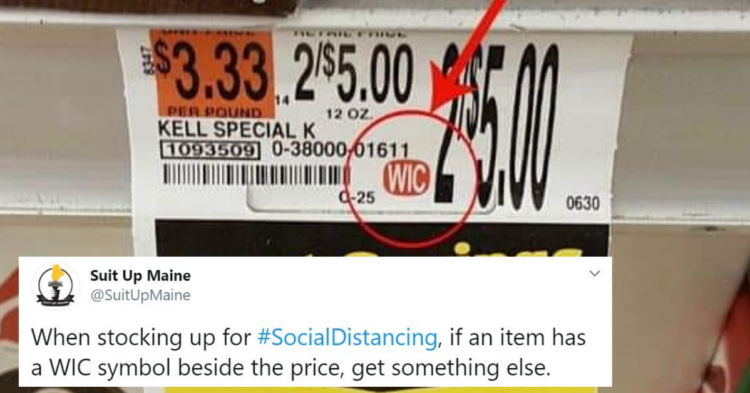The COVID-19 outbreak has many Americans fearing a nation-wide quarantine, and in preparation for being locked inside their homes for an extended period of time, many people are rushing to their local grocery stores to stock up on essentials.
But in the midst of all this coronavirus-induced panic-buying , one viral tweet is strongly encouraging shoppers to think twice before throwing any items marked with a “WIC” sticker into their grocery carts.
Information about the coronavirus pandemic is rapidly changing and Diply is committed to providing the most recent data as it becomes available. Some of the information in this story may have changed since publication, and we encourage readers to use online resources from CDC and WHO to stay up to date on the latest information surrounding COVID-19 .
On March 15, Suit Up Maine, an “all-volunteer progressive constituent action group,” tweeted out the advisory.

“When stocking up for #SocialDistancing, if an item has a WIC symbol beside the price, get something else,” the group wrote .
Although many of us would likely never take a second look at an item’s price sticker, it’s actually incredibly important that we do in order to make sure we aren’t clearing grocery shelves of these “WIC”-marked products.
As it turns out, these stickers indicate specific items that can be purchased through the Special Supplemental Nutrition Program for Women, Infants, and Children.
Run by the Department of Agriculture’s Food and Nutrition Service, this program provides nutritious food to low-income pregnant, postpartum, and breastfeeding women, as well as those with children aged 5 and below.
“People who use WIC to feed their kids can’t switch to another brand or kind of food,” Suit Up Maine explained online. “If a store runs out of WIC-approved options, they will go home empty-handed.”
As per the program, eligible families receive checks or vouchers from state-run programs to purchase these WIC-marked foods every month.

Grocery stores who participate in the program will then leave WIC stickers next to eligible products (such as eggs, milk, cheese, and peanut butter) so people know what is and what is not included.
In 2018, approximately 6.87 million people received these WIC benefits, according to the USDA website . Of that number, around 3.52 million were children, 1.71 million were infants, and 1.63 million were women.
Suit Up Maine’s tweet has racked up over 36,000 likes and nearly 27,000 retweets in just a few days.
In the comments, many Twitter users expressed surprise at finding out about the WIC stickers for the first time, and others said they would now be in high alert so as to not mistakenly buy any themselves.
“I learned something new today,” this user wrote. “Thank you, this is so important and is a small selfless way to help our fellow community members during this fearful time.”
Some users even suggested other ways people can help those in need during this difficult time.
“People should consider buying five or ten items and donate them to food banks,” this user wrote. “People in need can’t just stock up or use a credit card.”
The tweet has apparently struck a chord with a few celebrities, too.
Actress Kerry Washington retweeted Suit Up Maine’s photo and added, “If you see something labeled ‘WIC’ please [choose] another brand. People who rely on WIC products to feed their kids cannot.”
“We’re all in this together.”
Less than an hour later singer Janelle Monáe retweeted Washington’s post about the stickers.
In her own tweet, Monáe revealed that she was a “WIC baby” and urged people to “PLEASE read labels.”
WIC rules allow for substitutions during a pandemic, such as the one currently plaguing the world right now.

As the USDA website explains, states can apply for special waivers that allow program recipients to purchase a different brand when specific WIC-marked items are all sold out.
Suit Up Maine echoed this fact in a follow-up tweet, where they also revealed they’re working with state legislators to request such a waiver.
They wrote that Sen. Angus King has been contacted regarding the potential WIC product shortage as a result of panic-buying, and the group is now making efforts to request substitution waivers.
“We urge people in other states to do the same,” they wrote.
Each state typically has different guidelines as to what is offered under the WIC program, so make sure you check price stickers very closely.

As we continue combating this pandemic, it’s important that we remember we’re all in this together, and we look out for each other. If you can, kindly avoid buying WIC-marked products so everyone can prepare for a possible lockdown situation.
















































